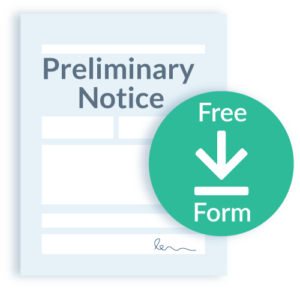Private jobs
Preliminary notice is not required.
Parties who contract directly with the property owner are not required to send preliminary notice in Illinois.
Preliminary notice is not required.
Parties who contract directly with the property owner are not required to send preliminary notice in Illinois.
N/A
On public jobs, any claims for non-payment are made against the general contractor's bond. Since GCs will not make a claim against their own bond for non-payment, they do not have bond claim rights, and have no preliminary notice requirement.
If working on single-family owner-occupied residence, notice required within 60 days of starting work.
Additionally, a Notice of Intent to Lien must be provided within 90 days of last furnishing labor and/or materials on ALL projects.
Preliminary notice is not required.
Illinois does not require a preliminary notice to be sent in order to retain rights to make a claim against the payment bond secured for a project. However, there are many reasons why sending a preliminary notice even when not specifically required can sometimes be beneficial.
A traditional preliminary notice will never be required from a general contractor. However, GC’s are required to provide a Sworn Statement on all private projects, and provide statutory notice language in addition to the sworn statement on owner-occupied, single-family, residential projects.
As far as all other potential claimants are concerned, a preliminary notice (aka Notice to Owner, 60-Day Notice) is only required on owner-occupied, single-family residential projects to secure the right to file an Illinois mechanics lien.
• Determining if the property is an owner-occupied residence may prove tricky. Check out the Expert Center response to this contractor’s question: Is a residence considered owner occupied if the owners are not living there during remodeling
Warning to those working on Home Repairs or Remodeling in Illinois, which is subject to the Illinois Home Repair and Remodeling Act, must deliver a “Home Repair: Know Your Consumer Rights” pamphlet prior to the start of work. While not sending this document will not impact a party’s contractual or mechanics lien rights, it will give the homeowner a remedy to sue the contractor under the consumer fraud act for an unspecified amount of damages. Read about this requirement in Illinois Legislature Amendment May Save Mechanics Lien Rights for Home Remodelers.
• Note: there is also a 90-Day Notice of Intent to Lien required before filing your Illinois mechanics lien claim, for more on Illinois NOIs, see: IL Notice of Intent to Lien Overview & FAQs
A general contractor’s Sworn Statement and/or Owner-Occupant Warning Notice must be provided before any payment is made.
A Notice to Owner should be sent within 60 days of first furnishing labor or materials to the project.
All Illinois preliminary notices are required to be sent to the property owner, or their agent. However, it’s always a good idea to send the notice to the general contractor as well.
• Owner-Occupant Warning Notice- if there is more than one owner that resides on the property, if served on one, it is deemed to be served on all owners.
Sworn Statement
• Names & addresses of all parties furnishing labor, services, or materials to the project
• Amounts due or to become due to each party listed
• Made under oath or verified by affidavit
GC Owner-Occupant Warning Notice
The following statement in 10pt, bold type:
THE LAW REQUIRES THAT THE CONTRACTOR SHALL SUBMIT A SWORN STATEMENT OF PERSONS FURNISHING LABOR, SERVICES, MATERIAL, FIXTURES, APPARATUS OR MACHINERY, FORMS OR FORM WORK BEFORE ANY PAYMENTS ARE REQUIRED TO BE MADE TO THE CONTRACTOR
Notice to Owner
To be valid, the notice must be in at least 10pt, bold type, and contain the following:
• Claimant’s name & address
• Hiring party’s name & address
• Date of first furnishing labor and/or materials to the project
• General description of labor and/or materials provided
• The following warning statement in bold-faced font as required by 770 ILCS 60/5(b)(ii):
The subcontractor providing this notice has performed work or delivered material to your home improvement contractor. These services or materials are being used in the improvements to your residence and entitle the subcontractor to file a lien against your residence if the labor, services, material, fixtures, apparatus, or machinery, forms or form work are not paid for by your home improvement contractor. A lien waiver will be provided to your contractor when the subcontractor is paid, and you are urged to request this waiver form your contractor when paying for home improvements.
The Sworn Statement and Owner-Occupant Warning Notice are typically incorporated into the construction contract. If not, there is no specific provision regarding delivery, so the following methods are considered best practice.
All other notices should be sent by certified mail, return receipt requested, with delivery restricted to the addressee only; or by personal delivery.
All Illinois preliminary notices, if sent by certified mail, are considered served upon deposit in the mail. However, actual receipt is still required to be valid; and that burden lies with the notifying party.
• See: Mailing Construction Notices: Is notice served when mailed or delivered?
A general/direct contractor’s failure to provide the Sworn Statement or Owner-Occupant Warning Notice is fatal to the claimant’s lien rights.
If a subcontractor fails to provide the Notice to Owner within 60 days of first furnishing, the claimant’s lien rights are waived “to the extent the owner has not been prejudiced by payments made before receipt of the notice.” In other words, the claim of a sub who failed to provide timely notice will be limited to the unpaid balance that the owner has yet to pay the original contractor.
See the answer to this IL sub’s question in the Expert Center, for more on this:
No. Illinois does not require any preliminary notice to be given to preserve the right to make a bond claim on a public project, nor to make a claim on the contract funds due to the general contractor.
N/A
N/A
N/A
N/A
You are a subcontractor who performed work on a project in Texas in November 2021.
First, the Illinois Mechanics Lien Act only applies to projects in the State of Illinois. To learn about your lien rights in Texas, I recommend contacting Texas Construction Counsel.
Second, remember that lien rights are the sole means to reach the owner of the project. If you are too late to enforce your TX lien rights, you have no recourse against a party with whom you have no contractual relationship (such as the owner).
Third, unlike the owner of the project, you do have contractual privity with the GC that hired you. If nothing else, you may sue that GC for breach of contract, unjust enrichment, and potentially for breach of fiduciary duty due to failure to turn over proceeds to you as the sub.
I hope this information has been helpful. Best of luck.
General contractors, or any other party with a direct contract with the property owner, are not required to give preliminary notice in Illinois. Other project participants, however, are required to send notice in order to maintain the ability to file a valid and enforceable mechanics lien. On residential projects, parties other than those who contracted directly with the property owner are required to provide a 60-day preliminary notice within 60 days from first furnishing labor or materials to the project. This is a “traditional” preliminary notice requirement, and it is crucial to comply if the work or materials being furnished are for the improvement of an owner-occupied single-family residence (1-4 units).
On all jobs, project participants not in direct contract with the property owner are required to send a Notice of Intent to Lien within 90 days of the last day that service or materials were provided. Note that this means that parties on a residential project must send both a 60-day preliminary notice and a 90-day notice of intent to lien in order to qualify for mechanics lien protection.
An additional requirement is also applicable to home repairs or remodeling work. This type of work is subject to the Illinois Home Repair and Remodeling Act, which requires project participants to deliver a “Home Repair: Know Your Consumer Rights” pamphlet prior to the start of work. This notice does not impact the future lien rights of any construction participant, but failure to provide the notice gives the homeowner a remedy to sue the contractor under the consumer fraud act. Read about this requirement in Illinois Legislature Amendment May Save Mechanics Lien Rights for Home Remodelers.

Read the step-by-step guide to preparing and serving a preliminary notice in Illinois. This article will walk you through everything you need to know about the form, the information required, and the rules for delivering notice.

Illinois’s mechanics lien laws are specific about the language and information that you must include on notice. Download a free preliminary notice form here. Our forms are prepared by construction attorneys to meet the requirements in Illinois’s statute, making it easy to get this part right.
Download a free notice of intent form for your 90-day notice.

Making a mistake on the preliminary notice form could cause you to lose your right to file an Illinois mechanics lien if you don’t get paid later on. It’s critical to verify all of the the information to ensure that it’s completely accurate.

Illinois law is strict about serving a preliminary notice. It must be served upon the Property Owner for residential projects within 60 days from first furnishing labor or materials to the project. If mailed, notice must be delivered by certified mail return receipt requested with delivery restricted to the addressee only.
Select Preliminary Notice document.
Provide basic job information.
Levelset sends the document for you. Postage included!